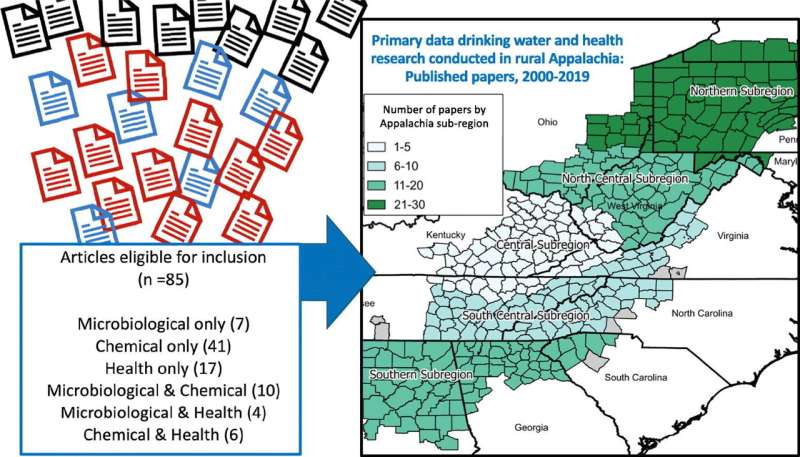This article has been reviewed according to Science X's editorial process and policies. Editors have highlighted the following attributes while ensuring the content's credibility:
fact-checked
peer-reviewed publication
trusted source
proofread
Appalachian drinking water quality and health data lacking, study finds

Faced with a drought of data concerning Appalachian drinking water quality and resulting health outcomes, researchers dug deeply to find what trickles they could.
Alasdair Cohen, assistant professor of environmental epidemiology in public health, has studied drinking water and health challenges in rural areas internationally and in California. Since arriving at Virginia Tech in 2019, he has been studying similar issues in rural Appalachia.
"My first few years at Virginia Tech, I reached out to academics, nonprofits, and state and local government agencies to try and better understand what was known about water quality in the region," said Cohen, who researches and teaches in the Department of Population Health Sciences at the Virginia-Maryland College of Veterinary Medicine. "I was waiting for someone to say, 'Oh, we have the data, here it is,' as far as these are the contaminants of concern for a particular region. But increasingly it became apparent that data on water quality and related health outcomes in rural areas are limited."
Amanda Darling, a doctoral student in the College of Engineering's Charles E. Via, Jr. Department of Civil and Environmental Engineering who is mentored by Cohen, is the lead author on a recently published systematic review and meta-analysis peer-reviewed study in the journal Science of the Total Environment. The study examined 3,452 scientific publications from the past 20 years to find data that met pre-established criteria for gauging microbial and chemical drinking water contamination in Appalachia and associated health outcomes.
The study found only 85 such publications, with a scarcity of studies involving the Central Appalachian region or asking questions about health outcomes.
"As someone who has been working on issues related to water and sanitation in Appalachia for over a decade, I was not surprised by these results," said Leigh-Anne Krometis, associate professor of biological systems engineering in the College of Engineering and a co-author of the study. "Unfortunately, while Appalachia has long been recognized as a region with acute infrastructure needs, on-the-ground data sets are incredibly limited, which makes the identification and prioritization of effectiveness interventions very difficult."
The researchers cast a wide net to find any prior studies that are relevant.
"We also included papers whose research questions may not have even been focused just on drinking water quality and contaminants we're interested in," Darling said. "Some were focusing just on impacts from fracking, but we took the data, still being under our big research umbrella of things we were looking at. So even though we did find 85 eligible papers, a lot of them weren't intended to answer the questions we are interested in."
Darling said many of the existing studies were conducted in response to various contamination events, such as chemical spills in rivers.
Five of the seven co-authors are associated with Virginia Tech. Besides Darling, Cohen, and Krometis, co-authors include Hannah Patton, who recently finished her Ph.D. in biological systems engineering, and Md Rasheduzzaman, a postdoctoral researcher in the population health sciences working with Cohen. Two undergraduates at the University of Virginia at Wise are also co-authors, Rachel Guevera and Joshua McCray.
"The benefit of a systematic review and meta-analysis study is that it provides a rigorous way to review a body of literature and then systematically extract data and analyze it," Cohen said. "In a way, it's like a lab experiment. This is where this type of study differs from a narrative review. In a systematic review, you also review the literature, but you do so in a way that, like a lab experiment, could be replicated and ideally is pre-specified."
The study will help researchers from Virginia Tech and elsewhere know what gaps need to be filled, which in the case of Appalachian drinking water quality and contaminants are many and wide.
The study also provided an important opportunity for graduate and undergraduate students to participate as authors on a publication in an important scientific journal, starting with the lead author, Darling, a Via Scholar in the College of Engineering. Darling completed her undergraduate work at the University of Illinois and has received master's degrees in environmental engineering and public health at Virginia Tech.
"I try to provide opportunities for graduate and undergraduate students to be involved in research that can lead to co-authorship opportunities on journal papers," Cohen said. "For me, that's a really important part of mentoring to try to provide those opportunities. I think it's exciting for anybody to contribute to a scientific publication, but I've found from my experience it's especially so for undergrads."
Cohen is leading multiple research studies in rural areas in partnership with local utilities and nonprofits in Southwest Virginia and with collaborators at Virginia Tech, the University of Virginia, and East Tennessee State University. Together, they are collecting water samples, survey and health data, and sharing water testing results with households, all to help fill some of the research gaps identified in this new publication.
More information: Amanda Darling et al, Microbiological and chemical drinking water contaminants and associated health outcomes in rural Appalachia, USA: A systematic review and meta-analysis, Science of The Total Environment (2023). DOI: 10.1016/j.scitotenv.2023.164036
Journal information: Science of the Total Environment
Provided by Virginia Tech





















